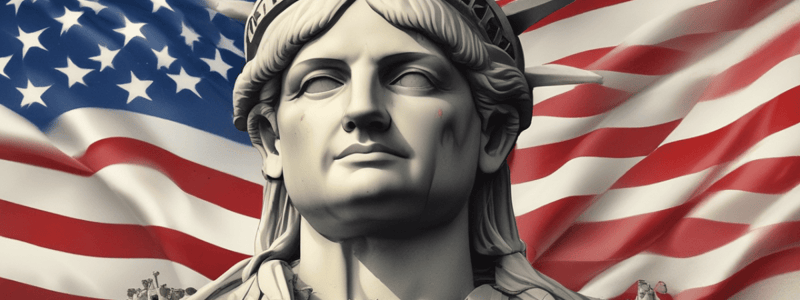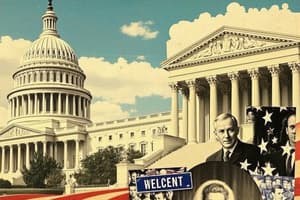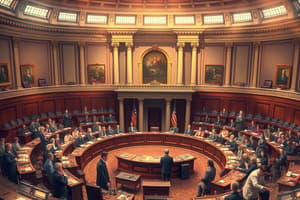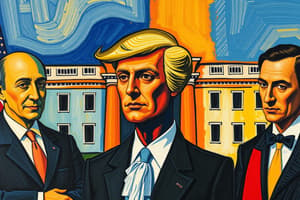Podcast
Questions and Answers
What is the tone of the speaker in the passage?
What is the tone of the speaker in the passage?
- Angry
- Optimistic
- Neutral
- Pessimistic (correct)
According to the passage, the speaker believes that liberties are well-protected in America.
According to the passage, the speaker believes that liberties are well-protected in America.
False (B)
What is the speaker's concern about the government?
What is the speaker's concern about the government?
The speaker is concerned that the government may become tyrannical and oppress the people.
The speaker mentions that bribery is practiced in the _________ of Commons in England.
The speaker mentions that bribery is practiced in the _________ of Commons in England.
Match the following phrases with their meanings:
Match the following phrases with their meanings:
What is the speaker's opinion about the amendment process?
What is the speaker's opinion about the amendment process?
The speaker believes that the English system of government is more reliable than the American system.
The speaker believes that the English system of government is more reliable than the American system.
What is the speaker's main concern about the government's ability to abuse power?
What is the speaker's main concern about the government's ability to abuse power?
What is the speaker's main concern about the plan being discussed?
What is the speaker's main concern about the plan being discussed?
According to the speaker, liberty is often destroyed by the licentiousness of the people.
According to the speaker, liberty is often destroyed by the licentiousness of the people.
What is the speaker's warning to those who neglect to resist their oppressors or negligently suffer their liberty to be wrested from them?
What is the speaker's warning to those who neglect to resist their oppressors or negligently suffer their liberty to be wrested from them?
The speaker states that most of the human race are now in a ______________________ condition.
The speaker states that most of the human race are now in a ______________________ condition.
What is the consequence of nations that have gone in search of grandeur, power, and splendor?
What is the consequence of nations that have gone in search of grandeur, power, and splendor?
The speaker believes that those in power will not abuse the powers given to them.
The speaker believes that those in power will not abuse the powers given to them.
Match the following terms with their definitions:
Match the following terms with their definitions:
What is the speaker's fear about the plan being discussed?
What is the speaker's fear about the plan being discussed?
What is the ultimate goal of the government according to the passage?
What is the ultimate goal of the government according to the passage?
The passage suggests that the adoption of the system is necessary for liberty.
The passage suggests that the adoption of the system is necessary for liberty.
What are the 'great rights' mentioned in the passage that are being considered for relinquishment?
What are the 'great rights' mentioned in the passage that are being considered for relinquishment?
The passage suggests that the security of liberty ought to be the direct end of your _______.
The passage suggests that the security of liberty ought to be the direct end of your _______.
Match the following concepts with their corresponding descriptions:
Match the following concepts with their corresponding descriptions:
What is the required majority for proposing amendments?
What is the required majority for proposing amendments?
The speaker believes that the amendment process is easily achievable.
The speaker believes that the amendment process is easily achievable.
What is the speaker's concern about the holders of power?
What is the speaker's concern about the holders of power?
To propose amendments, a ______________ of the Congress or State Legislatures is necessary.
To propose amendments, a ______________ of the Congress or State Legislatures is necessary.
What is the speaker's main concern about the system?
What is the speaker's main concern about the system?
The speaker believes that the State Legislatures are more likely to concur on amendments.
The speaker believes that the State Legislatures are more likely to concur on amendments.
Match the following phrases with their meanings:
Match the following phrases with their meanings:
What is the speaker's attitude towards the possibility of achieving amendments?
What is the speaker's attitude towards the possibility of achieving amendments?
What is the main concern of the speaker in the passage?
What is the main concern of the speaker in the passage?
The speaker believes that the plan being discussed is a confederation of states.
The speaker believes that the plan being discussed is a confederation of states.
What is the significance of the phrase 'We, the people' in the passage?
What is the significance of the phrase 'We, the people' in the passage?
The speaker compares the plan being discussed to a monarchy, like ____________________.
The speaker compares the plan being discussed to a monarchy, like ____________________.
Match the following systems of government with their descriptions:
Match the following systems of government with their descriptions:
The speaker is confident in the ability of the government to protect the liberties of the people.
The speaker is confident in the ability of the government to protect the liberties of the people.
What is the speaker's main concern about the plan being discussed?
What is the speaker's main concern about the plan being discussed?
What does the speaker mean by 'this poor little thing—the expression, We, the people'?
What does the speaker mean by 'this poor little thing—the expression, We, the people'?
What is the speaker concerned about in the passage?
What is the speaker concerned about in the passage?
The speaker believes that a small minority can prevent the adoption of amendments.
The speaker believes that a small minority can prevent the adoption of amendments.
What is the speaker's main concern about the government's ability to abuse power?
What is the speaker's main concern about the government's ability to abuse power?
According to the speaker, ________________ part of the American people may prevent the removal of grievances.
According to the speaker, ________________ part of the American people may prevent the removal of grievances.
Match the following phrases with their meanings:
Match the following phrases with their meanings:
What is the speaker's concern about the amendment process?
What is the speaker's concern about the amendment process?
The speaker believes that the current system is reliable and efficient.
The speaker believes that the current system is reliable and efficient.
What is the speaker's main concern about the amendment process?
What is the speaker's main concern about the amendment process?
According to the passage, the speaker believes that three-fourths of the State Legislatures are necessary to concur in amendments.
According to the passage, the speaker believes that three-fourths of the State Legislatures are necessary to concur in amendments.
What is the minimum number of Congress or State Legislatures required to propose amendments, according to the passage?
What is the minimum number of Congress or State Legislatures required to propose amendments, according to the passage?
To propose amendments, a ______ of the Congress or State Legislatures is necessary.
To propose amendments, a ______ of the Congress or State Legislatures is necessary.
Match the following phrases with their meanings:
Match the following phrases with their meanings:
What is the minimum number of State Legislatures or State Conventions required to concur in amendments, according to the passage?
What is the minimum number of State Legislatures or State Conventions required to concur in amendments, according to the passage?
According to the passage, the speaker believes that the amendment process is easily achievable.
According to the passage, the speaker believes that the amendment process is easily achievable.
What is the speaker's concern about the holders of power, according to the passage?
What is the speaker's concern about the holders of power, according to the passage?
What is the minimum percentage of people required to agree on amendments according to the passage?
What is the minimum percentage of people required to agree on amendments according to the passage?
According to the passage, a small minority can prevent the adoption of amendments.
According to the passage, a small minority can prevent the adoption of amendments.
What is the speaker's main concern about the amendment process?
What is the speaker's main concern about the amendment process?
In the passage, the speaker mentions that a _________ part of the American people may prevent the removal of grievances.
In the passage, the speaker mentions that a _________ part of the American people may prevent the removal of grievances.
Match the following phrases with their meanings:
Match the following phrases with their meanings:
According to the passage, the speaker believes that the current system is reliable and efficient.
According to the passage, the speaker believes that the current system is reliable and efficient.
What is the consequence of a small minority rejecting amendments, according to the speaker?
What is the consequence of a small minority rejecting amendments, according to the speaker?
What is the speaker's attitude towards the amendment process?
What is the speaker's attitude towards the amendment process?
What is the main concern of the speaker in the passage?
What is the main concern of the speaker in the passage?
The speaker believes that the plan being discussed is a confederation of states.
The speaker believes that the plan being discussed is a confederation of states.
What does the speaker mean by 'this poor little thing—the expression, We, the people'?
What does the speaker mean by 'this poor little thing—the expression, We, the people'?
The speaker compares the plan being discussed to a monarchy, like ____________________.
The speaker compares the plan being discussed to a monarchy, like ____________________.
What is the significance of the phrase 'We, the people' in the passage?
What is the significance of the phrase 'We, the people' in the passage?
Match the following systems of government with their descriptions:
Match the following systems of government with their descriptions:
What is the speaker's concern about the government's ability to abuse power?
What is the speaker's concern about the government's ability to abuse power?
Flashcards are hidden until you start studying
Study Notes
Liberty and Government
- The speaker is concerned about the potential loss of liberty and the dangers of tyranny in the system of government being proposed.
- The goal of government should be to secure liberty, not to increase trade or make people powerful.
Threats to Liberty
- The speaker believes that the system being proposed endangers liberty by taking away the right to trial by jury and the liberty of the press.
- The abandonment of these sacred rights will not lead to security, but rather to the loss of liberty.
Importance of Trial by Jury
- Trial by jury is a fundamental right that is being taken away in civil cases and is not sufficiently secured in criminal cases.
- This right is essential to liberty and is being threatened by the proposed system.
Historical Precedent
- The majority of nations have lost their liberty due to the tyranny of rulers or the negligence of the people.
- The speaker cites the example of nations that have sought grandeur, power, and splendor but have lost their freedom in the process.
Bribery and Corruption
- The speaker mentions the practice of bribery in the English House of Commons, where members have risen to preferments by selling the rights of the people.
- The speaker notes that even a small group of corrupt individuals can oppress the rest of the people.
American Liberty
- American liberty is on a shakier foundation than English liberty, making it more vulnerable to loss.
- The speaker suggests that it is easy to procure opposition to any alteration, no matter how judicious, and that the people should be vigilant in protecting their liberty.
Concerns about the Government System
- The speaker expresses concerns about the government system, stating that it may lead to unworthy characters gaining power and preventing the introduction of amendments.
- Two-thirds of Congress or State Legislatures are necessary to propose amendments, but three-fourths of State Legislatures or State Conventions must concur in the amendments.
- This means that a small number of states or legislatures can obstruct the adoption of amendments, even if they are necessary and salutary.
Potential for Abuse of Power
- The speaker notes that a small minority can prevent the alteration of an oppressive government, which is contrary to the spirit of republicanism and democracy.
- One-twentieth of the American people may prevent the removal of grievous inconveniencies and oppression by refusing to accede to amendments.
Critique of the Compact
- The speaker questions whether the compact between states is a confederation or a consolidated government.
- The use of the phrase "We, the people" instead of "the States of America" implies a consolidated government, which the speaker argues is pernicious, impolitic, and dangerous.
Comparisons to Other Systems
- The speaker compares the government system to monarchies like England, where there are checks on the power of the prince to secure the liberty of the people.
- The speaker also compares it to confederacies like Holland, where independent states retain their individual sovereignty.
Concerns about the Government System
- The speaker expresses concerns about the government system, stating that it may lead to unworthy characters gaining power and preventing the introduction of amendments.
- Two-thirds of Congress or State Legislatures are necessary to propose amendments, but three-fourths of State Legislatures or State Conventions must concur in the amendments.
- This means that a small number of states or legislatures can obstruct the adoption of amendments, even if they are necessary and salutary.
Potential for Abuse of Power
- The speaker notes that a small minority can prevent the alteration of an oppressive government, which is contrary to the spirit of republicanism and democracy.
- One-twentieth of the American people may prevent the removal of grievous inconveniencies and oppression by refusing to accede to amendments.
Critique of the Compact
- The speaker questions whether the compact between states is a confederation or a consolidated government.
- The use of the phrase "We, the people" instead of "the States of America" implies a consolidated government, which the speaker argues is pernicious, impolitic, and dangerous.
Comparisons to Other Systems
- The speaker compares the government system to monarchies like England, where there are checks on the power of the prince to secure the liberty of the people.
- The speaker also compares it to confederacies like Holland, where independent states retain their individual sovereignty.
Studying That Suits You
Use AI to generate personalized quizzes and flashcards to suit your learning preferences.




